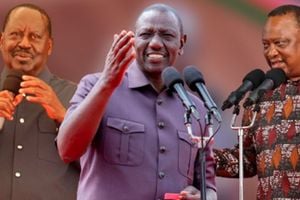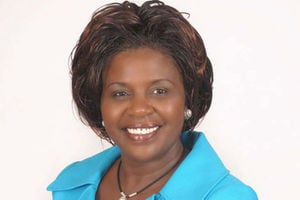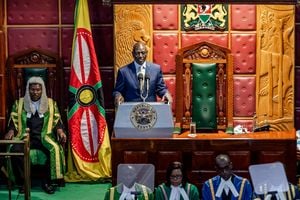How BBI turned tables on Uhuru succession plan

Deputy President William Ruto with President Uhuru Kenyatta and ODM leader Raila Odinga.
When President Uhuru Kenyatta and opposition leader Raila Odinga shook hands on the steps of Harambee House on March 9, 2018, the gesture ushered an uncertain future for Deputy President William Ruto and a whole different 2022 succession matrix for the Head of State.
While he had considered himself the shoo-in successor of President Kenyatta, Dr Ruto’s place as the Jubilee leader’s heir-apparent has been chipped at with every turn of the Handshake journey. Two years later, the DP’s 2022 election strategy appears not to have factored in his boss’ backing, and is mainly centred around competing against Mr Odinga.
2022 election
Political analysts argue BBI has given President Kenyatta the best chance to re-engineer his succession in 2022.
“The BBI report and the expected legislation will ensure Uhuru gets his succession plans as per design. He’s most likely going to have his way. It also means that Ruto is left in a very awkward position as the report is not as unpalatable as Tangatanga had hoped or wished for. For Uhuru and Raila, the expanded executive will help carry most of the country by working with key regional kingpins,” political commentator Herman Manyora told the Nation.
The BBI document unveiled yesterday after months of speculation is likely to further widen the rift between the Jubilee duo, who had stormed into power in 2013 with the promise of a 20-year presidency changing hands from President Kenyatta to his deputy in 2022.
On Wednesday, both President Kenyatta and Mr Odinga insisted the BBI report was not about “the presidency for Raila, and the prime minister for Uhuru”, according to Mr Odinga, with the Head of State insisting all they wanted to do was cure the winner-takes-all situation that he said was bad for Kenya.
Hinged on nine-key points; ethnic antagonism and competition, divisive elections, corruption, lack of national ethos, inclusivity, devolution, safety and security, shared prosperity and responsibilities and rights, the document according to its proponents will cure the country’s problems even though critics insist it’s all about 2022 succession politics.
Automatic candidate
Prof Hezron Mogambi argues that “BBI has changed the President’s succession plan”.
“Of course, originally, the issue was about Jubilee party, where William Ruto would have been the automatic candidate and perhaps, President. But now, the political field has been thrown wide open and front-runners like opposition leader Raila Odinga, who is one of the architects of BBI, have become a force to reckon with,” Prof Mogambi said.
Prof Mogambi says after the expected referendum, President Kenyatta’s succession plan will have changed completely with the new power structure and constitution “because even political realignments would be the new normal. It is a game changer.”
According to Mr Dismas Mokua, the architects of the reforms and Kenyans must pay attention to electoral reforms to guarantee free, fair and credible elections that reflect the will of Moraa.
Kenyans, he argues, must treat with contempt politicians who take positions on the BBI informed by personalities instead of content.
“All said and done, BBI the report must not be used as a political ladder but rather as a document that supports the Kenyan project. At the end of the day, BBI must be aligned to national and public interests,” Mr Mokua says.
Political and governance expert Javas Bigambo cautions against using the report for political gain in 2022.
Handshake agenda
“BBI politics should not engulf the nation in partisan politics that may end up being converse to the very object of the handshake agenda,” says Mr Bigambo.
He adds: “To invite national discourse, open and objective discussions should be entertained, without demonising those holding alternative views, or to compel everyone to swallow the BBI pill blindly, hook line and sinker.”
For Dr Ruto, the handshake introduced a dilemma: damned if he does, damned if he does not.
"Raila is not a threat to Ruto on his own, but, backed by Uhuru, who has the real power to thwart his chances, Ruto has every reason to worry. Uhuru and Raila are now joined at the hip, and together, they are a real threat," Mr Manyora argued.
Fuelling Dr Ruto's dilemma, Mr Manyora argued, is not really the handshake itself, but the fear that his boss, Mr Kenyatta, might turn against him in favour of Mr Odinga when he needs his support the most—in 2022.
"Of all the people that this handshake has unsettled, William Ruto is definitely on top of the list. The possibility of him getting a real shot at State House has reduced from 100 per cent before the handshake to about 40 per cent now," Mr Manyora said.
The uncertainty for Dr Ruto started right after the handshake, with questions still lingering to date whether he knew about the peace offering, when he did, and why he was not present during the historic event.
Dr Ruto has since explained that he was briefed on the matter, but Mr Odinga, on the other hand, insists the handshake was only between the two and neither Dr Ruto nor Mr Odinga's deputy Kalonzo Musyoka knew about it beforehand, and that they were made aware only a few minutes before the two leaders walked out of a meeting in the President's office for the handshake.
Kenyatta and Odinga families
“From his utterances and behaviour, we now know for sure that Raila Odinga will be on the ballot (for the presidency) in 2022. You just need to see how he goes round saying it is not okay for ODM politicians to work with Ruto, the man who deputises the man whose hands he shook. It is unbelievable!” Nandi senator Samson Cherargei told the Nation in a previous interview.
But while Dr Ruto has a problem with Mr Odinga—who has been emboldened by the handshake and the age-old relations between the Kenyatta and Odinga families—his problem, really, is how to address the newfound relationship between his boss and Mr Odinga.
Should he openly and fiercely oppose Mr Odinga’s new ties with President Kenyatta and risk the wrath of a leader seeking to end his final term on a high note as a peace-building Kenyan? Or, should he wait and hope that all goes well even with the new relationship, that some of Mr Odinga’s allies have suggested, including in public, could mean Mr Odinga being ‘made’ president in 2022?
These are some of the questions currently facing Dr Ruto about Mr Odinga, which are well summarised by political scientist Mutahi Ngunyi as the “rise of a man who was deemed a pariah to the country’s second most powerful man”.
Dr Ruto has previously described Mr Odinga’s referendum drive as an attempt “by lazy people who don’t want to work hard and incompetent people who cannot formulate any meaningful development programmes, and some who lose elections to use the Constitution as the bogeyman.
It will be interesting, then, to see what position he takes in the BBI debate when it is put as a question for Kenyans to vote on in a plebiscite.
(Download a copy of the BBI Report: BBI REPORT)






